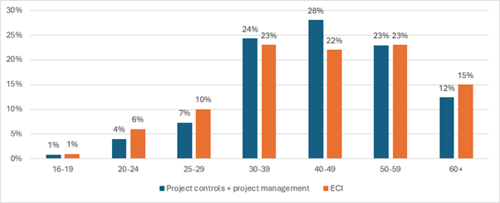Upskilling and training project professionals in Engineering Construction industry is key to meeting demand increase
Association for Project Management (APM) is highlighting the need for increased recruitment and upskilling of project managers in the engineering construction industry (ECI) to address the rising demands and growing skills gap. This comes in response to newly published research by the Engineering Construction Industry Training Board (ECITB), which has revealed the scale of increased demand for project managers in the ECI over the coming years.
The ECITB’s Labour Forecasting Tool (LFT) is a resource which provides insights into workforce numbers across regions and sectors, predicting trends and potential future demand for workers in the industry up to 2035. The LFT forecast has been updated and now indicates that peak demand for extra workers will be in 2030.
The tool estimates that there are 5,860 project managers working in the engineering construction industry as of 2025 (i.e. people with this specific role, rather than all project and programme professionals). The number of project managers in the ECI is predicted to increase by 22% in the next five years, reaching 7,170 by 2030. Factors that are attributed to this increased demand include the delays of some projects that now coincide with other planned activity, meaning that more work will need to be done in the next few years, along with an upcoming wave of possible retirements in key roles, requiring a new influx of talent to fill the gaps.
The ECITB says 'project manager' will be one of the occupations most in demand, along with mechanical fitters, electrical technicians, process engineers, pipefitters, welders and design technicians. It has been reported that engineering and construction projects in the renewable energy sector will be one of the areas where project managers and project controllers will be most in-demand.
ECITB Chief Executive, Andrew Hockey, said: “These updates to the LFT give us the latest picture of future labour needs. It provides a strong evidence base to inform decision-making in helping address ECI skills shortages. The data from this tool shows how vital it is for the project profession to increase recruitment, whilst also continuing to train and upskill existing workers. By doing this, the profession has a fighting chance of closing the skills gap and of ensuring that the ECI has the skilled project managers it needs for the future.”
Professor Adam Boddison OBE, Chief Executive of APM, added: “It’s clear from this data that the demand for project managers within the engineering construction industry is only going to increase over the next few years. It is up to us within the profession to ensure that there are enough skilled project managers to fill these gaps, by increasing recruitment of new workers whilst continuing to train and develop those we already have. In doing so, we can ensure that the engineering construction industry is able to successfully deliver critical infrastructure and major projects successfully.”
State of the project profession
ECITB also shared data with APM from their 2024 Workforce Census, which revealed more insights into the state of the project profession. The data showed there are more than 9,700 workers in roles the ECITB class as project-related, as of June 2024. These are distributed across the following occupations and sectors:
|
Occupation |
# |
|
Project Managers |
4349 |
|
Planning Professionals |
1455 |
|
Cost Engineers |
544 |
|
Document controls Professionals |
489 |
|
Project controls Professionals |
432 |
|
Planning Managers |
342 |
|
Project management Support |
331 |
|
Project controls Managers |
331 |
|
Estimating Professionals |
302 |
|
Cost controls Professionals |
127 |
|
Risk Managers |
112 |
|
Project (IT) Managers |
98 |
|
Estimating Managers |
84 |
|
Document controls Managers |
70 |
|
Risk Professionals |
70 |
|
Project controls Apprentices and trainees |
68 |
|
Project controls Support |
65 |
|
Project (Commercial) Managers |
59 |
|
Cost controls Managers |
53 |
|
Project (Civil) Managers |
46 |
|
Project management Apprentices and trainees |
44 |
|
Project (EPC) Managers |
39 |
|
Planning Engineers |
33 |
|
Estimating Engineers |
27 |
|
Project (Health and safety) Managers |
23 |
|
Planning Apprentices and trainees |
21 |
|
Other |
110 |

Heatmap showing location of project professionals:

Age profile, comparison with entire ECI:

Gender profile, comparison with entire ECI:


0 comments
Log in to post a comment, or create an account if you don't have one already.